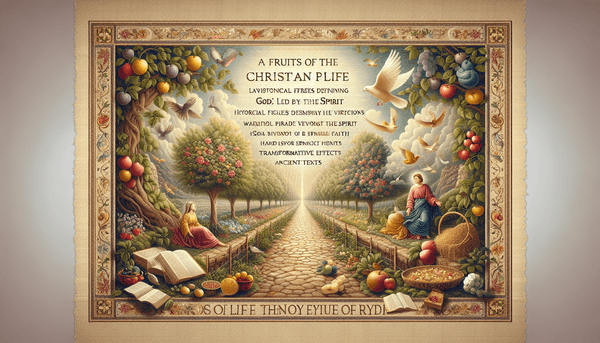Trusting in God's Sovereignty and Goodness
When Jesus said, \"Let not your heart be troubled\" (John 14:1), He was addressing the inner turmoil that arises from uncertainty and distress. It was not a mere suggestion, but a gentle command to place our trust in the unchanging character of God and His promises. This is a call for a trust that transcends intellectual assent and ushers in a state of peace to our troubled hearts. To trust in God is to lean on the assurance of His sovereignty and goodness, as Proverbs 3:5-6 urges us to do, recognizing that He will make our paths straight. This trust is further reinforced by the peace that surpasses all understanding, which guards our hearts and minds in Christ Jesus (Philippians 4:6-7). As we embrace a spirit of power, love, and self-discipline (2 Timothy 1:7), the fear that once loomed large is dispelled by the confidence that the Lord is our light and salvation (Psalm 27:1).
The Significance of Name Changes in the Bible
The Bible recounts several instances where God changes a person's name to signify a transformation in their identity and divine purpose, as He did with Abram and Sarai. When God changed Abram's name to Abraham, He was establishing a new identity as 'father of many nations' (Genesis 17:5). Similarly, Sarai's name was changed to Sarah, meaning 'princess,' signifying her role as the mother of nations (Genesis 17:15-16). These name changes were not only symbolic but were also God's way of revealing His promises and plans for their lives. As modern believers, we can draw inspiration from these stories to embrace our spiritual identity in Christ. In the Bible, a new name often represents a new beginning or a divine calling, as seen in Isaiah 62:2 and Revelation 2:17. Understanding the power of the name of Jesus is crucial, as it is the name above all names and the only one through which salvation is found (Acts 4:12).
Biblical Teachings on Joy and Contentment
The Apostle Paul exemplifies contentment regardless of his circumstances, as he states in Philippians 4:11-13, learning to be content in whatever situation he found himself. This sense of peace and satisfaction is part of the Fruit of the Spirit, which includes joy as a divine gift (Galatians 5:22). Cultivating joy and contentment in our daily lives often involves a conscious effort to practice thankfulness and trust in God's provision. The call to rejoice always and give thanks in all circumstances (1 Thessalonians 5:16-18) is not just an ideal but a practical instruction for living a fulfilled life. As we dwell in God's presence, we find the fullness of joy (Psalm 16:11), and by being content with what we have, we can rely on God's promise never to forsake us (Hebrews 13:5).
Discerning Godly Relationships
The relationships we form and maintain can significantly influence our faith journey and personal growth. The Bible emphasizes the importance of discerning the character of those we associate with, as 'iron sharpens iron' (Proverbs 27:17). We are advised to test the spirits to determine their origin (1 John 4:1) and to recognize people by their fruits, as Jesus taught in Matthew 7:16. Pursuing righteousness, faith, love, and peace with those who call on the Lord (2 Timothy 2:22) can enrich our lives and draw us closer to God. Moreover, the company we keep can either uplift us or lead us astray, as 1 Corinthians 15:33 reminds us of the impact of good or bad company on our behavior and decisions.
Setting Healthy Boundaries
Scripture teaches us the importance of honoring our parents while also acknowledging the need for personal boundaries. The commandment to 'honor your father and mother' (Exodus 20:12) is accompanied by a call for parents to not provoke their children (Ephesians 6:1-4). This delicate balance requires open communication and mutual respect. Jesus Himself illustrated the priority of our commitment to God over familial ties (Luke 14:26), suggesting that while family is important, it should not supersede our relationship with God. Establishing boundaries is also an expression of love, as 1 Corinthians 13:4-7 describes love as patient, kind, and not self-seeking. Boundaries enable healthy interactions and help prevent the negative consequences of enmeshment or control.
Conclusion
In conclusion, the lessons we glean from Scripture are as relevant today as they were when first penned. By embracing the teachings on trust, identity, joy, relationships, and boundaries, we can navigate life's complexities with a sense of purpose and peace. The journey of faith is an ongoing one, and as we continue to seek understanding through the Word of God, we are reminded of the support that lies within its pages and the Christian community at large. May we each find the strength and wisdom to apply these timeless principles to our lives, as we grow in our spiritual walk and enhance our well-being.






